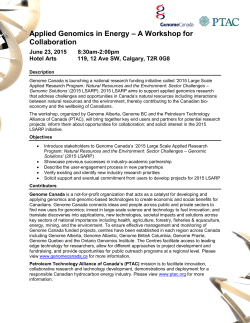
Personal Genome Diagnostics Study Highlights Limitations of Tumor
PERSONAL GENOME DIAGNOSTICS STUDY HIGHLIGHTS LIMITATIONS OF TUMOR-ONLY SEQUENCING FOR CANCER Study in Science Translational Medicine Confirms that Many Genetic Alterations Identified by Tumor-Only Sequencing are ‘False Positives’ TM PGDx’s CancerSelect Targeted Gene Profiling Panel Provides for Sequencing Both Normal and Tumor DNA to Accurately Identify True Cancer-Specific Changes BALTIMORE, MD, April 15, 2015 – Personal Genome Diagnostics, Inc. (PGDx), a provider of advanced cancer genome analysis and testing services, today announced the publication of a landmark study showing that many of the genetic alterations identified using tumor-only sequencing are not actually associated with the cancer, but instead reflect inherited germline mutations already present in the normal cells of the 1 individual. The study is in the April 15 edition of Science Translational Medicine and was conducted by PGDx scientists working in collaboration with company co-founders Dr. Victor Velculescu and Dr. Luis Diaz, Jr. and their colleagues at Johns Hopkins University. In the study, researchers from PGDx and the Johns Hopkins Kimmel Cancer Center compared DNA from tumors and from normal cells in 815 patients with a wide variety of cancers. They found that almost half of patients analyzed using tumor-only approaches had genetic alterations detected in their tumors that were also present in their normal cells, indicating that the alterations were ‘false positive’ changes not specific to the tumor. The growing use of personalized medicine is predicated on tailoring treatments to the genetic makeup of the patient’s tumor, so the high rate of false positives uncovered in the study has implications for the accuracy of the approach when it relies on tumor-only sequencing. Siân Jones, PhD, Vice President of Genome Sciences at PGDx and a co-author of the study, commented, “We knew from our pioneering whole exome analyses of cancer patients that a significant number of the genetic alterations that were thought to be associated with tumors were also present in the inherited germline DNA. By comparing tumor DNA to DNA from normal tissue, we were able to separate out those genetic alterations that are truly tumor-specific. Accurately identifying tumor-specific alterations is essential to realizing the potential of personalized medicine to achieve better treatment outcomes. As a result of this work, we decided to include the option to analyze both normal and tumor tissue DNA when we launched our TM CancerSelect targeted gene panel, which is designed to detect those genetic alterations in the individual’s cancer that are most relevant to optimizing treatment. The study published today with our colleagues at Johns Hopkins University is a powerful validation of that decision.” The researchers identified 382 genetic alterations in the study patients that were potentially tumor-specific by first detecting all of the genetic changes in their tumors and then eliminating those that were well-known germline alterations. However, when the remaining genetic alterations were compared to the genomic profiles of the patients’ germline DNA, an average of 249, or 65%, turned out to be false positive changes that were already present in the normal cells. The researchers also looked at the alterations in “actionable genes,” which were defined as genes which have been identified as potential targets for cancer drugs or investigational cancer therapies. In the study, 48%, or almost half of the tumor samples, had at least one false positive mutation in an “actionable gene.” These findings are noteworthy because use of false positive findings to guide personalized treatment decisions could result in a substantial number of patients receiving therapies that are not optimized for their cancer. Antony Newton, Chief Commercial Officer at PGDx, noted, “PGDx is committed to leadership in bringing the latest advances in cancer genomics to the researchers, drug developers, healthcare providers and patients we serve. Our founders are pioneers in the field and their continuing involvement with the company allows us to rapidly incorporate new scientific knowledge into our internal R&D programs, which are charged with continuously refining and improving our approaches. We also are well-situated to contribute real world insights and resources to advancing the science of cancer genomics, as exemplified in the collaboration between PGDx and Johns Hopkins that produced this landmark study.” PGDx’s CancerSelect Targeted Gene Panel analyzes FFPE samples to detect all major genetic alteration types with high sensitivity and specificity, covering nearly all of the actionable cancer genes currently associated with therapies that are FDA-approved or in actively-enrolling clinical trials. It offers the option to compare tumor DNA with normal DNA to differentiate cancer-specific mutations from the germline mutations already present at birth. PGDx is the only company offering a complete range of cancer genome analysis tools, including exome and targeted approaches for tissue specimens, targeted approaches for plasma samples and a variety of custom tissue and plasma-based options designed to address the specific research needs of cancer researchers and drug developers. 1 - S. Jones, V. Anagnostou, K. Lytle, S. Parpart-Li, M. Nesselbush, D. R. Riley, M. Shukla, B. Chesnick, M. Kadan, E. Papp, K. G. Galens, D. Murphy, T. Zhang, L. Kann, M. Sausen, S. V. Angiuoli, L. A. Diaz Jr., V. E. Velculescu, Personalized genomic analyses for cancer mutation discovery and interpretation. Science Translational Medicine 7, 283ra53 (2015). About Personal Genome Diagnostics Personal Genome Diagnostics (PGDx) provides advanced cancer genome analyses to oncology researchers, drug developers, clinicians and patients. The company uses advanced genomic methods and its deep expertise in cancer biology to identify and characterize the unique genomic alterations in tumors. PGDx’s proprietary methods for genome sequencing and analysis are complemented by its extensive experience in cancer genomics and clinical oncology. Co-founders Luis Diaz, MD, and Victor Velculescu, MD, PhD, are internationally recognized leaders in cancer genomics who have extensive experience in the practical application of advanced genomic technologies to research, drug development and clinical practice. PGDx’s CLIA-certified facility provides personalized cancer genome analyses to patients and their physicians. For more information, visit www.personalgenome.com. ### Contacts PGDx Corporate: Antony Newton Chief Commercial Officer 410-849-9189 anewton@personalgenome.com PGDx Media: BLL Partners, LLC Barbara Lindheim 212-584-2276 blindheim@bllbiopartners.com
© Copyright 2025








